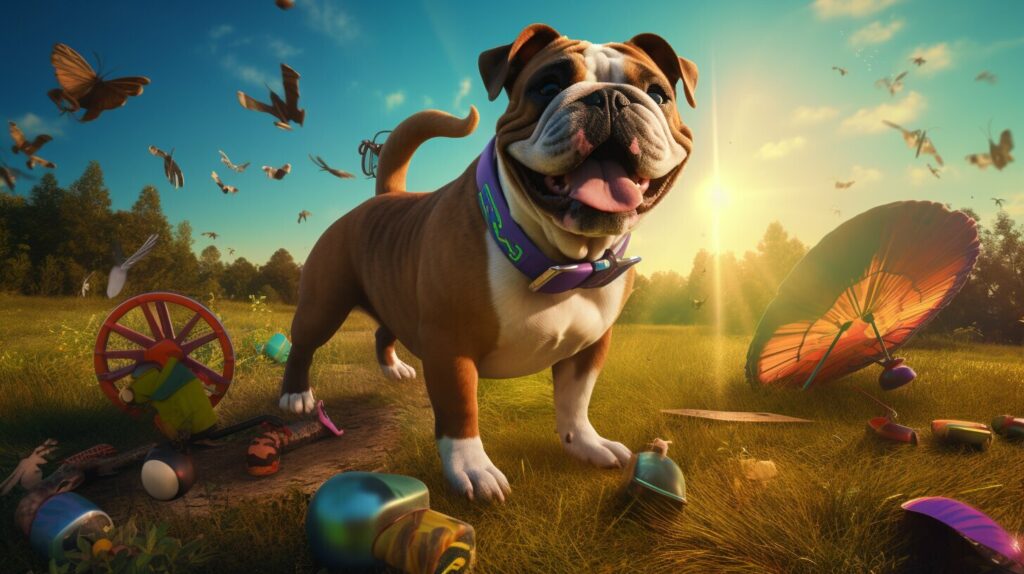If you’re a bulldog lover, you know these dogs are more than just pets – they’re family. But owning a bulldog comes with unique challenges and responsibilities. From their distinctive appearance to their affectionate personalities, there’s a lot to love about bulldogs. In this guide, we’ll cover everything you need to know about bulldog breeds, care, training, characteristics, temperament, and health. By the end, you’ll be equipped with the knowledge and resources to provide your bulldog with the best life possible.
Key Takeaways:
- Understanding the specific care needs of bulldogs is crucial to their health and well-being
- Bulldogs have distinct characteristics and temperament that require proper training and socialization
- Maintaining a healthy lifestyle, including regular exercise and veterinary care, is important for bulldog health
Understanding Bulldog Breeds
Bulldog dogs belong to a breed group that has been around for centuries. Over time, different bulldog breeds have emerged, each with unique physical characteristics and personality traits. Here’s an overview of the three most common bulldog breeds:
| Bulldog Breeds | Country of Origin | Physical Characteristics |
|---|---|---|
| English Bulldog | England | Short, stocky build with wrinkly skin and a distinctive pushed-in nose |
| French Bulldog | France | Small and muscular with large, upright ears and a short, smooth coat |
| American Bulldog | United States | Tall and athletic with a powerful build and short, straight coat |
Despite their physical differences, all bulldog breeds share a similar temperament. They are generally loyal, protective, and affectionate towards their owners. However, they can also be stubborn and independent, which can make training a challenge. It’s essential to understand the characteristics of each bulldog breed to ensure that you choose the right one for your lifestyle.
Bulldog Care Tips
Bulldogs are a beloved breed known for their affectionate nature and distinctive appearance. However, caring for them can require some extra attention and effort. Here are some key tips to keep in mind when it comes to bulldog care:
| Grooming | Feeding |
|---|---|
| Bathing: Bulldogs should be bathed regularly, but not too frequently as this can dry out their skin. Use mild shampoo specifically formulated for dogs. | Diet: Bulldogs are prone to obesity, so it’s important to monitor their food intake and stick to high-quality dog food. Avoid overfeeding and giving them table scraps. |
| Brushing: Bulldogs have a short, smooth coat that requires weekly brushing. Use a soft-bristled brush to remove loose hair and prevent matting. | Water: Make sure your bulldog has access to fresh, clean water at all times. This is especially important during hot weather to prevent dehydration. |
| Ear cleaning: Bulldogs have floppy ears that can trap moisture and debris, leading to infections. Clean their ears weekly with a dog-specific ear cleaner and cotton balls. | Treats: Bulldogs love treats, but they should be given in moderation. Opt for healthy, low-calorie treats and avoid anything that contains harmful ingredients such as chocolate. |
When it comes to exercise, bulldogs don’t need a lot of it but should still get a daily walk or playtime to keep them healthy and happy. Avoid strenuous exercise and activities in hot weather due to their susceptibility to heatstroke.
It’s also important to keep up with regular veterinary check-ups and vaccinations to maintain your bulldog’s health. Stay vigilant for any signs of health issues such as breathing difficulties, skin irritations, or digestive problems. Early detection can make all the difference in treatment and recovery.
By following these bulldog care tips, you can ensure that your furry friend stays happy, healthy, and loved.
Training Your Bulldog
Training your bulldog can be a challenging task, but with patience and consistency, you can successfully train them to be a well-behaved companion. Bulldogs are intelligent dogs, so it’s important to keep training sessions engaging and mentally stimulating.
Basic Obedience Commands
Start with the basics such as sit, stay, come and down. Use positive reinforcement with treats and praise to encourage good behavior. Bulldogs respond well to consistency, so be sure to use the same commands and rewards each time.
When teaching your bulldog to walk on a leash, use a harness instead of a collar to prevent breathing issues. Start with short walks and gradually increase the distance. If your bulldog pulls on the leash, stop or change direction until they follow your lead.
House Training
Bulldogs can be stubborn when it comes to house training, but with a little persistence, they can be trained successfully. Take them outside frequently and reward them with treats and praise when they eliminate outside.
Consistency is key to successful house training. Use the same door to go outside each time and keep a regular feeding schedule. Crate training can also be useful when teaching your bulldog to hold their bladder for longer periods of time.
Addressing Common Behavioral Issues
Bulldogs can be prone to certain behavioral issues like chewing and digging. Providing plenty of toys and chew bones can help prevent destructive behavior. When catching your bulldog in the act, redirect them to an appropriate activity.
Excessive barking can also be a problem, but training them to bark on command and rewarding them for quiet behavior can be effective. Socializing your bulldog from a young age can also help prevent aggressive behavior towards other dogs and strangers.
By following these training tips and techniques, you can help your bulldog become a well-behaved and obedient companion.
Bulldog Characteristics and Temperament
Bulldogs are known for their distinct physical appearance and unique personality traits. Understanding their characteristics and temperament is essential for providing proper care and training.
One of the most noticeable characteristics of bulldogs is their wrinkled face, flat nose, and droopy jowls. They also have a muscular build and a friendly expression, which makes them a popular companion for families with children.
Despite their intimidating looks, bulldogs are known for their gentle nature and affectionate personality. They are incredibly loyal to their owners and thrive on attention and companionship.
However, it’s important to note that bulldogs can also be stubborn and determined. This can make training a challenge, but with patience and consistency, they can be taught obedience commands and good behavior.
Bulldog Temperament
Bulldogs are generally calm and relaxed, which makes them a great choice for apartments or smaller living spaces. They don’t require a lot of exercise, but they do enjoy short walks and playtime.
They are also highly protective of their owners and make excellent watchdogs. However, their protective nature can also manifest as aggression towards strangers or other animals if they don’t receive proper socialization.
Bulldogs have a moderate energy level and are typically content with spending time indoors with their families. They are affectionate and love to cuddle, but they can also be independent and enjoy having their own space.
In conclusion, bulldogs have a unique set of characteristics and temperament that make them a beloved breed among dog owners. Understanding their nature is essential for providing them with the proper care, training, and socialization they need to thrive.
Bulldog Health – Keeping Your Furry Friend Happy and Healthy
Bulldogs are known for their endearing wrinkly faces and lovable personalities, but they also require specific care to maintain their health and well-being. Here are some tips to keep your bulldog healthy:
Regular Veterinary Check-Ups
Regular check-ups with a veterinarian are crucial for maintaining your bulldog’s health. Your vet can monitor your bulldog’s weight, check for any signs of illness, and recommend preventative care measures such as vaccinations and flea/tick preventatives.
Dental Care
Bulldogs are prone to dental issues, so it’s important to take good care of their teeth. Brushing their teeth regularly and providing dental chews or toys can help prevent periodontal disease.
Exercise and Weight Management
Bulldogs have a tendency to gain weight, which can lead to health problems such as joint issues and breathing difficulties. Providing regular exercise and monitoring their diet can help your bulldog maintain a healthy weight.
Identifying Breed-Specific Health Concerns
English bulldogs, French bulldogs, and American bulldogs all have their own unique health concerns. Researching your bulldog’s breed can help you identify any potential health issues, such as hip dysplasia, respiratory problems, and skin allergies.
Monitoring Their Breathing
Bulldogs are brachycephalic, which means they have short snouts that can lead to breathing difficulties. It’s important to monitor their breathing and seek veterinary care if you notice any coughing, wheezing, or breathing difficulties.
Conclusion
By following these tips, you can ensure that your bulldog lives a happy and healthy life. Remember to prioritize their health and seek veterinary care whenever necessary to keep your furry friend feeling their best.
Bulldog-Friendly Environment: Creating a Safe Space for Your Bulldog
When it comes to caring for your bulldog, creating a safe and comfortable living space is essential. Bulldogs are sensitive dogs who require a lot of attention and care to thrive. Here are some tips for creating a bulldog-friendly environment:
Choose the Right Bedding
Bulldogs love to nap, so providing them with a comfortable bed is essential. Look for a bed that is soft, supportive, and easy to clean. A bed with a removable cover is ideal, as bulldogs shed a lot and can quickly make a mess. Memory foam beds are also a great option for bulldogs, as they provide plenty of support for their joints.
Provide Plenty of Toys
Bulldogs are known for their love of play, so providing them with plenty of toys is essential. Look for toys that are durable, as bulldogs have strong jaws and can easily destroy toys that aren’t made of tough materials. Interactive toys, like puzzle feeders, are also an excellent way to keep your bulldog mentally stimulated and engaged.
Keep Your Home Clean
Bulldogs shed a lot, so keeping your home clean is essential. Vacuum regularly to keep your floors and furniture free of hair, and wipe down surfaces to remove any dirt or grime. Regular cleaning can also help prevent allergies and other health issues.
Secure Your Living Space
Bulldogs can be escape artists, so it’s essential to secure your living space to keep them safe. Check your fence and gates to ensure they are secure, and use a leash when walking your bulldog outside. You may also want to consider crate training your bulldog to keep them safe when you’re not home.
Provide Plenty of Attention
Bulldogs thrive on attention and affection, so it’s essential to spend plenty of time with your bulldog. Take them for walks, play with them, and give them plenty of love and snuggles. Bulldogs can get lonely easily, so make sure they have plenty of social interaction with you and other family members.
By following these tips, you can create a safe and comfortable living space for your bulldog. With a little attention and care, your bulldog can lead a happy and healthy life.
Socializing Your Bulldog
Socialization is a crucial aspect of raising a bulldog. It helps them develop positive behaviors and become well-adjusted to different environments, people, and animals. Here are some tips on how to socialize your bulldog:
Start Early
Begin socializing your bulldog as early as possible, ideally when they are still puppies. This is when they are most receptive to new experiences and are still forming their behavior patterns.
Introduce Them to New People
Bulldog puppies should be introduced to a range of different people, including men, women, and children. Ensure the interaction is positive and provide rewards and treats for good behavior.
Introduce Them to Other Animals
Socialization with other animals is also important for a bulldog’s development. Start with other dogs that are known to be friendly and well-behaved. Keep the interactions short at first and gradually increase the length of time.
Take Them to New Environments
Take your bulldog to new environments, such as the park, beach, or pet store. Allow them to explore and experience different sights, sounds, and smells. This will help them become comfortable in various situations and avoid fear-based aggression.
Reward Good Behavior
Positive reinforcement is essential in socializing your bulldog. When they display good behavior, reward them with treats, praise, or toys. This will encourage them to continue the behavior and associate positive experiences with new people, animals, and environments.
With proper socialization, your bulldog can become a well-behaved, friendly, and confident companion.
Bulldog Dogs – Frequently Asked Questions (FAQs)
If you’re considering getting a bulldog or you already have one, you likely have some questions about their care, temperament, and health. Here are some of the most frequently asked questions about bulldogs:
What are the different bulldog breeds?
There are several bulldog breeds, including English bulldogs, French bulldogs, and American bulldogs. English bulldogs are known for their wrinkles and stocky build, while French bulldogs are smaller with distinctive “bat ears.” American bulldogs are muscular and athletic with a boxy head.
What are some common health issues for bulldogs?
Bulldogs are prone to certain health issues, such as hip dysplasia, allergies, and respiratory problems. They may also develop skin infections in their wrinkles if not cleaned and dried properly. Regular veterinary check-ups and proper care can help prevent and address these issues.
How much exercise do bulldogs need?
Bulldogs do not need as much exercise as some other breeds, but they still require daily walks and playtime. It’s important to monitor their activity levels and not overexert them in hot weather due to their potential breathing difficulties.
Are bulldogs good with children and other pets?
Bulldogs can make great family pets, but they should always be supervised around children due to their strong protective instincts. They may also have a high prey drive towards smaller animals, so early socialization with other pets is important.
What are some tips for grooming a bulldog?
Bulldogs require regular grooming to keep their coats healthy and free of mats. Brushing once or twice a week, cleaning wrinkles daily, and trimming nails regularly are all important aspects of their care. A veterinarian or professional groomer can offer guidance on specific products and techniques.
How can I prevent behavioral issues in my bulldog?
Consistent and positive training starting at a young age can help prevent behavioral issues in bulldogs, such as aggression or destructiveness. It’s important to establish yourself as the pack leader and use reward-based training methods. Consulting with a professional trainer may also be beneficial.
What is the life expectancy of a bulldog?
The typical lifespan of a bulldog is around 8 to 10 years, although with proper care and attention, some may live longer. Regular exercise, a healthy diet, and routine veterinary care can all contribute to a longer and happier life for your bulldog.
Conclusion
Congratulations on making it through this comprehensive guide on bulldog dogs! By now, you should have a solid understanding of the different bulldog breeds, their care needs, training requirements, characteristics, and overall health.
Remember, owning a bulldog comes with a great deal of responsibility, but the joy and love they bring to our lives are immeasurable. It’s important to provide them with the proper care, attention, and socialization to ensure they thrive and live long, happy lives.
Implement the tips and tricks provided in this guide and don’t hesitate to reach out to a professional for guidance on any specific concerns or issues. With your dedication and love, your bulldog will undoubtedly become your loyal and trustworthy companion for many years to come.
FAQ
Q: How long do bulldogs live?
A: On average, bulldogs have a lifespan of 8 to 10 years, although some can live longer with proper care.
Q: How much exercise do bulldogs need?
A: Bulldogs are not high-energy dogs and do not require intense exercise. They benefit from daily walks and mental stimulation to prevent obesity and promote overall health.
Q: Are bulldogs good with children?
A: Bulldogs are known for their gentle and patient nature, making them generally good with children. However, proper supervision and teaching children how to interact with dogs is always important.
Q: Can bulldogs get along with other pets?
A: With proper socialization, bulldogs can get along well with other pets. Early introductions and positive experiences are key to successful pet relationships.
Q: What are some common health issues in bulldogs?
A: Bulldogs are prone to certain health issues, including breathing difficulties, allergies, joint problems, and skin infections. Regular veterinary care and a balanced diet can help manage these concerns.



